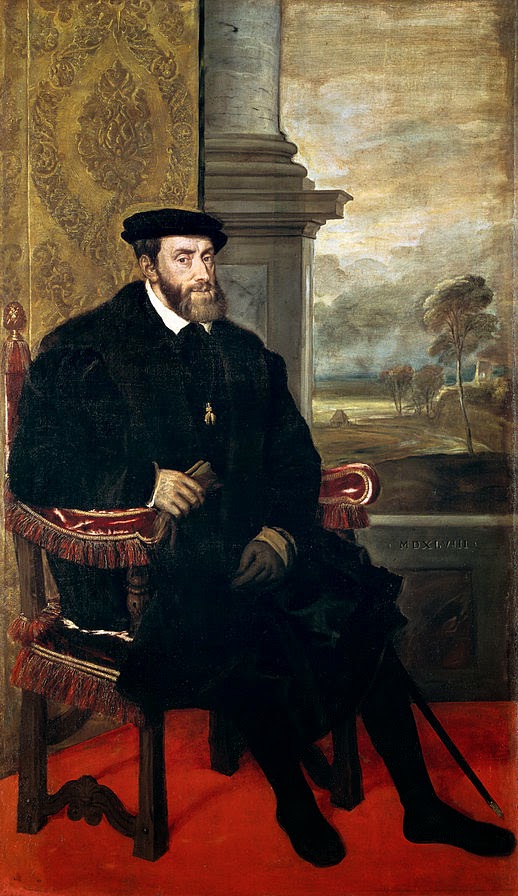Previously on The Peace of Augsburg and the Abdication of Charles V. And now William Robertson.
Time: 1555
Place: Augsburg, Germany
 |
| Charles V by Titian and his colleague Lambert Sustris. cc Wikipedia |
A step taken by the Protestants themselves, a short time after the opening of the Diet, rendered him still more cautious of giving them any new cause of offence. As soon as the publication of Ferdinand's speech awakened the fears and suspicions which have been mentioned, the electors of Saxony and Brandenburg, together with the Landgrave of Hesse, met at Naumburg, and, confirming the ancient treaty of confraternity which had long united their families, they added to it a new article, by which the contracting parties bound themselves to adhere to the Confession of Augsburg, and to maintain the doctrine which it contained in their respective dominions.
Ferdinand, influenced by all these considerations, employed his utmost address in conducting the deliberations of the Diet, so as not to excite the jealousy of a party on whose friendship he depended, and whose enmity, as they had not only taken the alarm, but had begun to prepare for their defense, he had so much reason to dread. The members of the Diet readily agreed to Ferdinand's proposal of taking the state of religion into consideration previous to any other business. But, soon as they entered upon it, both parties discovered all the zeal and animosity which a subject so interesting naturally engenders, and which the rancor of controversy, together with the violence of civil war, had inflamed to the highest pitch.
The Protestants contended that the security which they claimed in consequence of the Treaty of Passau should extend, without limitation, to all who had hitherto embraced the doctrine of Luther, or who should thereafter embrace it. The Catholics, having first of all asserted the Pope's right, as the supreme and final judge with respect to all articles of faith, declared that though, on account of the present situation of the empire, and for the sake of peace, they were willing to confirm the toleration granted by the Treaty of Passau to such as had already adopted the new opinions, they must insist that this indulgence should not be extended either to those cities which had conformed to the "interim," or to such ecclesiastics as should for the future apostatize from the Church of Rome. It was no easy matter to reconcile such opposite pretensions, which were supported, on each side, by the most elaborate arguments, and the greatest acrimony of expression, that the abilities or zeal of theologians long exercised in disputation could suggest. Ferdinand, however, by his address and perseverance; by softening some things on each side; by putting a favorable meaning upon others; by representing incessantly the necessity as well as the advantages of concord; and by threatening, on some occasions, when all other considerations were disregarded, to dissolve the Diet, brought them at length to a conclusion in which they all agreed.
Continued on Monday, October 27th.
More information here.
No comments:
Post a Comment